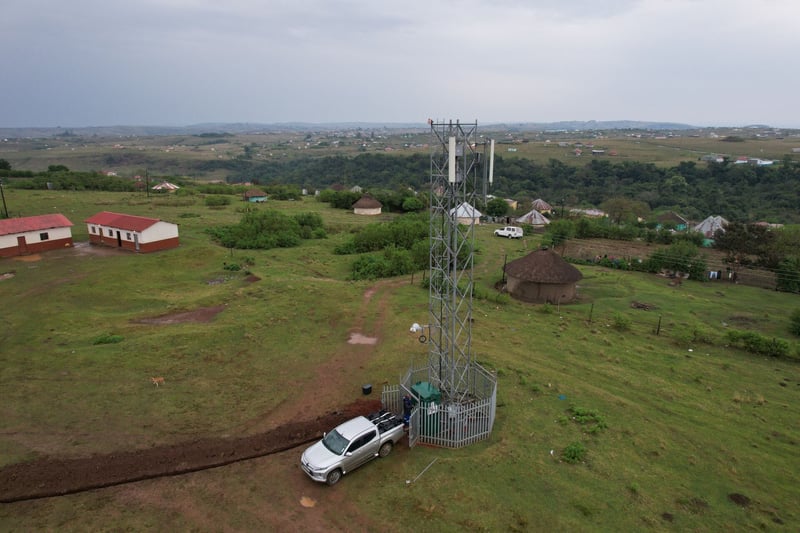System Failure - Why South Africa’s Rural Connectivity Is Falling Behind
Written by: Melini Moses Save to Instapaper
Johannesburg — As mobile networks accelerate 5G rollouts across South Africa, rural communities continue to lag behind, struggling with poor connectivity due to multiple issues including prolonged delays in getting infrastructure off the ground.
Industry role-players say red tape, municipal challenges and administrative delays are holding back progress, resulting in poorer communities experiencing frustration trying to access information on the internet, communicate with emergency services and their families, as well as run their businesses.
Stark Urban-Rural Disparities in Network Performance
While the country has made inroads in getting rural communities connected, network access and speed remain an issue. A study by Opensignal published in 2023, found that South African smartphone users observe a 14.4% slower average download speed and 29.2% slower upload speed experience in rural areas than in urban areas. The study also found that time spent with no signal was far higher in rural areas, with users in the Northern Cape and Limpopo recording the highest proportion of time with no signal. Part of the solution to this problem is the roll-out of more cell tower infrastructure within rural areas to improve network access and availability.
Infrastructure Bottlenecks
“It can take over a year to get through the permitting process to build a single cell tower,” says Sean Shipalana, Director of Moropa Site Solutions. “We face a chain of delays - some administrative, some structural, and some simply logistical.”
Erecting a tower involves approval from government departments at the national, provincial, and local levels. These include permits from the Civil Aviation Authority (CAA), environmental clearance from the Department of Forestry, Fisheries and the Environment (DFFE), consent approvals through municipal planning authorities, and building plan approvals from local government. Each step has its own timeline - often three to four months - making the cumulative delay difficult to manage.
However, the red tape is just one part of the challenge.
Municipal staff shortages
“Smaller municipalities that cover rural areas often face critical staffing shortages,” says Shipalana. “Applications for building plans or zoning permissions can sit unattended for months, not because of inefficiency, but because there simply aren’t enough staff to process them.”
Even when paperwork is submitted correctly, delays in inter-departmental coordination can stall the process. Follow-ups are often required at multiple points, and without dedicated tracking systems, progress is hard to monitor. These issues are further complicated by recent procedural changes - such as the CAA’s new requirement for obstacle assessments to go through two newly appointed service providers - Air Traffic and Navigation Services (ATNS) and Tsela Obstacle Safeguarding (Pty) Ltd.
The Human cost of connectivity gaps
“Often mobile network operators change plans and cancel their leases with tower operators when the permitting process takes more than a year. When this happens, not only is the costly application process in vain, but a local community that had been waiting in anticipation does not get the tower they need to service their area,” says Shipalana.
“The reality on the ground is that many learners in rural areas struggle to download school material due to poor signal. Small business owners often report difficulty processing mobile payments, and community safety efforts, including CCTV and emergency alerts, are often disrupted by unreliable network coverage.”
Connectivity is dignity
“We understand that regulations are in place for good reason, but if we are serious about closing the digital divide, we need more streamlined, coordinated systems that recognise the urgency of bringing infrastructure to rural South Africa,” says Shipalana.
“We need smarter processes, clearer timelines, better communication between departments, and proactive collaboration across sectors. This is not just about towers; it’s about dignity, equality, and creating a South Africa where everyone is connected to possibility.”
Moropa Site Solutions is a locally owned, independent tower operator. The company operates primarily in five provinces: Kwa-Zulu Natal, Mpumalanga, Limpopo, North-West and the Eastern Cape. The company focuses on building tower sites in the deep rural or underserviced areas of these provinces.
Get new press articles by email
Express Yourself offers a wide range of communication services, from PR and Copywriting, to media and communication training. People, purpose and passion are at the core of Express Yourself. The company's watchword is excellence.
Latest from
- “Without BEE, We Wouldn’t Exist” – Telecoms Leader Warns Against Dismantling Empowerment Laws
- The Domino Effect On South Africa’s Health System
- Poor Network Connectivity Stifles Women Entrepreneurship in Rural South Africa
- Her Story. Her Success. 100 Reasons to Believe in Women in Business
- South African women entrepreneurs celebrated at WomX
- Favourite Person – A Love Story No One Saw Coming
- Satellite Internet Won’t Solve South Africa’s Connectivity Crisis
- South African Innovation Targets Audit Failures and Corruption Loopholes
- South Africa Needs an E-Hailing Ecosystem That Values People as Much as Profit
- PsorAfrica - A united effort to address Africa’s dermatology gap and access to medication
- Twytch Ushers In A New Era in E-Hailing
The Pulse Latest Articles
- Strategy Is Easy. Execution Is Everything (March 5, 2026)
- The Paradox Of Leadership: Ntombizone Feni’s First Year As Ceo (March 4, 2026)
- Beyond The Pit: Why Mining Partnerships Are Being Redefined (March 2, 2026)
- A Refreshing Reset For Your Tastebuds (March 2, 2026)
- Celebrating 125 Years Of Hansgrohe: Setting The Beat Of Water Since 1901 (February 25, 2026)
